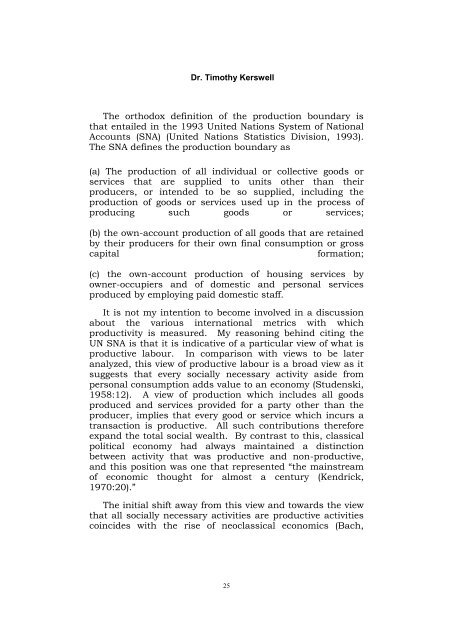Class, Productive and Unproductive Labour - Journal of Alternative ...
Class, Productive and Unproductive Labour - Journal of Alternative ...
Class, Productive and Unproductive Labour - Journal of Alternative ...
Create successful ePaper yourself
Turn your PDF publications into a flip-book with our unique Google optimized e-Paper software.
Dr. Timothy KerswellThe orthodox definition <strong>of</strong> the production boundary isthat entailed in the 1993 United Nations System <strong>of</strong> NationalAccounts (SNA) (United Nations Statistics Division, 1993).The SNA defines the production boundary as(a) The production <strong>of</strong> all individual or collective goods orservices that are supplied to units other than theirproducers, or intended to be so supplied, including theproduction <strong>of</strong> goods or services used up in the process <strong>of</strong>producing such goods or services;(b) the own-account production <strong>of</strong> all goods that are retainedby their producers for their own final consumption or grosscapitalformation;(c) the own-account production <strong>of</strong> housing services byowner-occupiers <strong>and</strong> <strong>of</strong> domestic <strong>and</strong> personal servicesproduced by employing paid domestic staff.It is not my intention to become involved in a discussionabout the various international metrics with whichproductivity is measured. My reasoning behind citing theUN SNA is that it is indicative <strong>of</strong> a particular view <strong>of</strong> what isproductive labour. In comparison with views to be lateranalyzed, this view <strong>of</strong> productive labour is a broad view as itsuggests that every socially necessary activity aside frompersonal consumption adds value to an economy (Studenski,1958:12). A view <strong>of</strong> production which includes all goodsproduced <strong>and</strong> services provided for a party other than theproducer, implies that every good or service which incurs atransaction is productive. All such contributions thereforeexp<strong>and</strong> the total social wealth. By contrast to this, classicalpolitical economy had always maintained a distinctionbetween activity that was productive <strong>and</strong> non-productive,<strong>and</strong> this position was one that represented “the mainstream<strong>of</strong> economic thought for almost a century (Kendrick,1970:20).”The initial shift away from this view <strong>and</strong> towards the viewthat all socially necessary activities are productive activitiescoincides with the rise <strong>of</strong> neoclassical economics (Bach,25
















